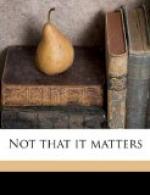A proper sense of proportion leaves no room for superstition. A man says, “I have never been in a shipwreck,” and becoming nervous touches wood. Why is he nervous? He has this paragraph before his eyes: “Among the deceased was Mr. ——. By a remarkable coincidence this gentleman had been saying only a few days before that he had never been in a shipwreck. Little did he think that his next voyage would falsify his words so tragically.” It occurs to him that he has read paragraphs like that again and again. Perhaps he has. Certainly he has never read a paragraph like this: “Among the deceased was Mr. ——. By a remarkable coincidence this gentleman had never made the remark that he had not yet been in a shipwreck.” Yet that paragraph could have been written truthfully thousands of times. A sense of proportion would tell you that, if only one side of a case is ever recorded, that side acquires an undue importance. The truth is that Fate does not go out of its way to be dramatic. If you or I had the power of life and death in our hands, we should no doubt arrange some remarkably bright and telling effects. A man who spilt the salt callously would be drowned next week in the Dead Sea, and a couple who married in May would expire simultaneously in the May following. But Fate cannot worry to think out all the clever things that we should think out. It goes about its business solidly and unromantically, and by the ordinary laws of chance it achieves every now and then something startling and romantic. Superstition thrives on the fact that only the accidental dramas are reported.
But there are charms to secure happiness as well as charms to avert evil. In these I am a firm believer. I do not mean that I believe that a horseshoe hung up in the house will bring me good luck; I mean that if anybody does believe this, then the hanging up of his horseshoe will probably bring him good luck. For if you believe that you are going to be lucky, you go about your business with a smile, you take disaster with a smile, you start afresh with a smile. And to do that is to be in the way of happiness.
The Charm of Golf
When he reads of the notable doings of famous golfers, the eighteen-handicap man has no envy in his heart. For by this time he has discovered the great secret of golf. Before he began to play he wondered wherein lay the fascination of it; now he knows. Golf is so popular simply because it is the best game in the world at which to be bad.
Consider what it is to be bad at cricket. You have bought a new bat, perfect in balance; a new pair of pads, white as driven snow; gloves of the very latest design. Do they let you use them? No. After one ball, in the negotiation of which neither your bat, nor your pads, nor your gloves came into play, they send you back into the pavilion to spend the rest of the afternoon listening to fatuous stories of some old gentleman who knew Fuller Pilch. And when your side takes the field, where are you? Probably at long leg both ends, exposed to the public gaze as the worst fieldsman in London. How devastating are your emotions. Remorse, anger, mortification, fill your heart; above all, envy—envy of the lucky immortals who disport themselves on the green level of Lord’s.




